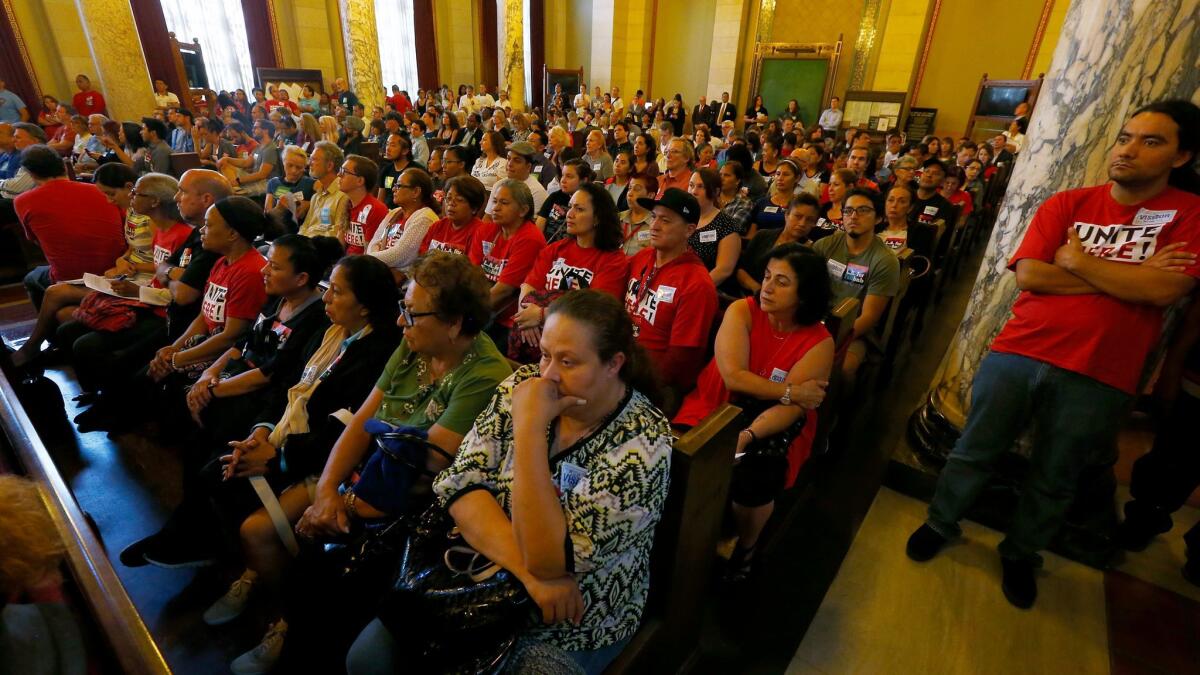L.A. lawmakers are still wrestling with how to regulate Airbnb

More than two years after Los Angeles lawmakers unveiled a proposal to legalize and regulate the popular practice of renting out rooms or whole homes for short stays, the city has yet to pass any new restrictions on Airbnb and similar platforms.
For the second time this year, hundreds of people crowded into City Hall on Tuesday for a hearing on the proposed regulations, but a City Council committee held off voting on the plan.
Instead, lawmakers asked city staff to report back with additional options, including loosening the proposed rules to allow people to rent out a second home for short stays.
Renting out a home or room for less than 30 days at a time is currently illegal in many residential areas of Los Angeles, according to planning officials. But as the phenomenon has exploded with the rise of Airbnb and similar platforms that allow hosts to offer rooms or entire homes to travelers, those rules have rarely been enforced.
Critics, including neighborhood activists, housing advocates and the hotel industry, complain that some houses and apartments have been rented out constantly, aggravating neighbors and exacerbating the housing crisis by taking rentals off the market for ordinary tenants. They have pushed for strict limits on the practice to eliminate “de facto hotels.”
Under draft rules that were first released last year, L.A. would cap short-term rentals at 180 days annually and allow hosts to rent out only their primary residence. Hosts would have to register with the city. And short-term rentals would be banned in homes that fall under the Rent Stabilization Ordinance, which covers the majority of apartment units in the city.
Violating the rules could lead to costly fines: Hosts could be fined at least $500 a day for advertising an illegal rental and at least $2,000 per day for exceeding the annual cap. L.A. could also impose fines of $1,000 per day on rental platforms that advertise illegal listings or refuse to turn over addresses of unregistered rentals.
Rental hosts argue that the proposed restrictions would devastate homeowners who make ends meet by renting out their homes on Airbnb, HomeAway or other platforms. At the Tuesday hearing, many said their short-term rentals were not harming their neighbors and did not eliminate housing because they would not have been rented out to longstanding tenants.
Airbnb, in turn, has warned the city that imposing the proposed rules could reduce tax revenue and hurt the local economy. It touted a report, released Tuesday by the Los Angeles Economic Development Corp., which found that Airbnb rentals will generate more than $600 million in new economic output annually.
Critics have countered that those economic benefits are offset by the cost of replacing housing. Last month, the Los Angeles Alliance for a New Economy, an advocacy group aligned with labor, argued it would cost taxpayers an average of $11.8 million monthly to replace the units taken off the market with “moderate income” housing.
City staff has estimated that out of roughly 23,000 units being rented out for short stays in Los Angeles, there are anywhere from 6,000 to 10,000 housing units that are not available to tenants because they are used primarily for short-term rentals.
That represents less than 1% of the units in the city, but staffers nonetheless argued that the rapid growth of the practice, as well as its concentration in tourist hot spots such as Venice and Hollywood, threatened housing availability and affordability in heavily affected neighborhoods.
At Tuesday’s hearing, Councilman Mitch Englander said he wanted to explore whether to permit “vacation rentals” — someone renting out a property other than their primary residence — with a possible cap on the total number of properties allowed.
Englander also asked for city staffers to report back on eliminating the annual cap for people renting out their primary residence as well as imposing a fee on travelers to fund affordable housing.
Councilman Bob Blumenfield also suggested that the city should consider allowing vacation rentals, possibly through a more stringent process that requires a public hearing.
“It should be a different process … you have to go through something that would give your neighbors a chance to weigh in,” Blumenfield said.
But Councilman Paul Koretz, who does not sit on the committee, appeared at the hearing to argue that L.A. should allow people only to rent out their own home for short stays, warning that looser rules could abet “corporations buying up dozens of units.”
The proposed regulations must be vetted by the committee and voted on by the entire council before they can become law.
Twitter: @LATimesEmily
More to Read
Sign up for Essential California
The most important California stories and recommendations in your inbox every morning.
You may occasionally receive promotional content from the Los Angeles Times.











